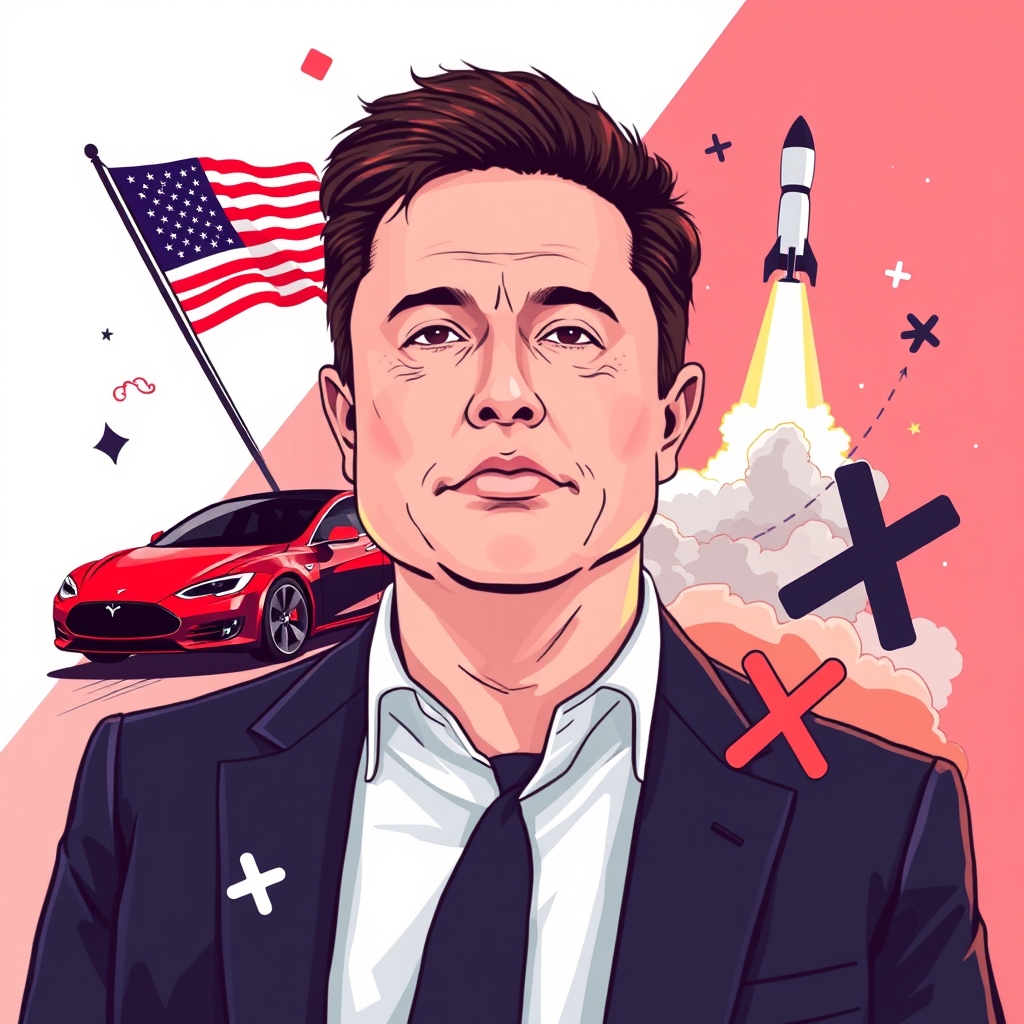Elon Musk’s America Party and Its Implications for Tesla, SpaceX, and X
Elon Musk’s recent announcement concerning the launch of the America Party has ignited a broad discussion regarding its potential influence on Musk’s diverse business empire—most notably Tesla, SpaceX, and the social platform X. This report examines the strategic rationale behind the political maneuver, its multifaceted impact on the companies, and the broader regulatory and market implications. Through analysis of regulatory trends, shifting consumer demographics, investor sentiment, and historical parallels, we provide an in-depth exploration of the opportunities and challenges that this development poses.
1. Strategic Rationale and Political Motivation
1.1 The America Party as a Regulatory Tool
The mid-2025 launch of Elon Musk’s America Party is widely interpreted as a strategic attempt to reshape the regulatory landscape. By engaging directly in the political arena, Musk aims to mitigate the risks associated with fluctuating regulatory policies that have, in the past, impacted his companies [1, 2]. Such political involvement is hypothesized to align regulatory oversight more closely with tech innovation imperatives, thereby providing a more supportive environment for high-tech enterprises including Tesla and SpaceX [2].
1.2 Dual-Edged Political Alignment
Musk’s growing political alignment—marked by an increasing appeal among Republican and conservative segments—presents both opportunities and vulnerabilities [3, 4]. While this shift may attract a new customer base for Tesla and potentially lend a political shield against adverse regulations, it simultaneously risks alienating progressive and traditional liberal customers who have been key to Tesla’s brand identity thus far [3, 4]. This polarization is not only a market segmentation challenge but also a significant reputational risk that could impact brand loyalty and long-term growth [3, 4].
1.3 Historical and Contextual Parallels
Historical political maneuvers, such as those during the Trump Administration, provide important contextual parallels. Past regulatory changes and politically influenced decisions have demonstrated that shifts in political alignment can precipitate both beneficial and contentious regulatory reforms [5]. Musk’s move into the political fray is reminiscent of previous high-profile interventions designed to steer government policy in favor of industry innovation. In particular, regulatory actions within the aerospace and technology sectors offer a template; similar maneuvers historically affected SpaceX and are likely to influence subsequent decision-making in this domain [5, 6].
2. Implications for Tesla
Tesla is arguably the most exposed to the political ramifications of Musk’s new venture. The company faces a complex blend of potential benefits and risks:
2.1 Market Segmentation and Brand Polarization
Recent analyses indicate that Tesla’s customer base is undergoing a measurable transformation. On one hand, Tesla has begun to capture a segment of the Republican market, which was previously underrepresented among its buyers [3, 4]. This diversification could, in theory, broaden Tesla’s market reach, especially as emerging models and innovative energy solutions gain traction with conservative consumers. However, this advantage carries the inherent risk of alienating traditional, progressive buyers who may find the overt political messaging incongruent with their values [3, 4]. This segmentation is reflected in shifting sales data and evolving consumer sentiment documented in Tesla’s internal performance metrics [1, 7].
2.2 Investor Sentiment and Market Volatility
In the immediate aftermath of the America Party announcement, Tesla’s stock experienced significant volatility, with shares plunging nearly 7–8% as investor anxiety mounted over the potential fallout from Musk’s political engagements [8, 9, 10]. Political risks, such as the possibility of regulatory backlash or the slashing of EV subsidies by influential political figures (e.g., threats from Trump), have heightened concerns regarding Tesla’s future market positioning [10, 11]. Amid these pressures, Tesla’s robust innovation strategy and its evolving sustainability metrics are being put to the test as the company works to reconcile its dual role as a pioneering technology firm and a politically entangled brand [1, 12].
2.3 Strategic Adaptations: Communication and Governance
In response to these challenges, Tesla is recalibrating its public narrative and internal governance structures. Documented shifts in customer education, advertising, and messaging are part of a strategic effort to maintain a broad appeal while navigating the heightened polarization [1, 7]. Additional adjustments in board and executive oversight—highlighted by concerns over fiduciary duties and performance-based compensation structures—reflect an ongoing process to integrate robust risk-management practices into Tesla’s corporate governance framework [13, 14]. These adaptations signal an attempt to balance Musk’s political ambitions with the need to safeguard investor confidence and long-term corporate stability [13, 15].
3. Implications for SpaceX and X
While Tesla may face the most immediate market pressures due to its consumer-facing nature, SpaceX and X are also likely to experience significant indirect effects from Musk’s new political alignment.
3.1 SpaceX: Navigating a Shifting Regulatory Landscape
SpaceX’s experience is expected to mirror the aerospace industry dynamics observed historically following political realignments [6]. With upcoming regulatory recalibrations that could affect sensing, launch services, and related operational areas, SpaceX will need to adapt its strategies to accommodate potential shifts in federal contracts, licensing processes, and international space policies. The America Party’s agenda, which is geared towards forging a closer alignment between regulatory policies and tech innovation, may provide SpaceX with both opportunities for favorable oversight and challenges in the form of increased geopolitical scrutiny [2, 5].
3.2 X: Social Media and Political Messaging
The social platform X, formerly known as Twitter, is directly implicated by Musk’s political endeavors. As Musk leverages his political persona through X, there will be a likely intensification of partisan content and political messaging on the platform. This transformation can have a dual impact: on one hand, it could create a loyal base of politically aligned users; on the other, it might exacerbate content moderation issues and regulatory challenges. Increased governmental and public scrutiny over political bias and free speech rule enforcement could force X to revisit its internal policies and compliance frameworks [15, 16, 17].
4. Broader Regulatory and Geopolitical Considerations
4.1 Deregulatory Trends and Technological Innovation
Recent regulatory trends in sectors such as banking and aerospace underscore a broader deregulatory momentum that appears to be closely aligned with the political ideologies underpinning the America Party [18, 19]. A movement toward more lenient oversight is anticipated not only in traditional sectors but also in the high-technology arena where both Tesla and SpaceX operate. Navigating this evolving regulatory environment will require an agile approach that integrates proactive risk management and advanced ESG (Environmental, Social, and Governance) frameworks [20, 21].
4.2 Global Supply Chains and International Market Dynamics
Political realignments in the U.S. may also interact with the global EV market. With Tesla’s supply chain already facing scrutiny over sustainability metrics—particularly in relation to misreported vehicle use-phase emissions [1, 12]—there is an increased risk of disruption should international competitors, especially those from China or the EU, benefit from state-backed subsidies and favorable regulatory changes [22, 23, 24]. Tesla’s response may involve diversifying production sources and intensifying investment in battery R&D and supply resilience measures [25, 26].
4.3 Geopolitical Decoupling and Investor Sentiments
The international political climate, notably the U.S.-China technological decoupling, further complicates the operational landscape for Musk’s companies [19, 27]. Proactive geopolitical strategies—outlined in recent analyses—suggest that aligning with a political construct that endorses innovation, deregulation, and competitive market dynamics might be a calculated strategy to secure long-term advantages in a geopolitically divided market [19, 27]. However, investor sentiment remains sensitive to these shifts, as evidenced by market reactions following Musk’s political statements and party-related activities [8, 9, 10].
5. Musk’s Personal Involvement and Future Trajectory
5.1 Direct Engagement in Party Leadership
Elon Musk’s active involvement in his new political party could manifest in several forms. He might directly take on a leadership role or serve as the key policy influencer, using his business acumen and technological foresight to shape the party’s platform. His unique position as a high-profile entrepreneur with deep ties to multiple sectors enables him to function as a bridge between the tech industry and political governance. The strategic use of his personal brand to secure endorsements and financial backing is also anticipated [4, 16, 17].
5.2 Strategic Communication and Policy Shaping
Beyond party leadership, Musk is likely to use his extensive media presence and control over platforms such as X to craft a narrative aimed at aligning government policy with the needs of high-innovation companies. This narrative may include proposals for deregulation, tax incentives for tech investments, and a reformed oversight framework that minimizes bureaucratic obstacles [2, 11, 28]. Such strategies are designed to not only protect his existing businesses but also create a favorable ecosystem for future technological projects and ventures. In this light, Musk’s political party could serve as an incubator for policy experiments that may have far-reaching implications on industries beyond his immediate business interests.
5.3 Risks and Mitigation Strategies
While the strategic integration of political and corporate objectives presents distinct advantages, it is not without significant risks. Investor worries, shifting public sentiment, and the potential for increased regulatory scrutiny pose genuine challenges [8, 9, 10, 15]. To mitigate these risks, Musk’s companies are likely to enhance their internal governance and risk management strategies, streamline communication channels across diverse stakeholder groups, and ensure a rigorous adherence to ESG norms to sustain both market confidence and long-term corporate sustainability [1, 13, 14].
6. Conclusion
The emergence of the America Party underscores a growing trend where business leaders are increasingly leveraging political influence to shape the operating environment in their favor. For Musk’s conglomerate, this move can be seen as a bold bid to reduce political risk and create a regulatory landscape that is more conducive to high-tech innovation and market expansion. However, the dual-edged nature of this political alignment also brings with it significant market volatility, reputational risks, and complex challenges in consumer and investor relations.
Tesla, in particular, will need to carefully balance its evolving market segmentation amidst heightened political polarization, while SpaceX and X must navigate the indirect impacts of altered regulatory scrutiny and global competitive dynamics. As Musk integrates his personal brand into political leadership, the coming months will be critical in determining whether this strategic maneuver solidifies his companies' market positions or contributes to further uncertainties in a politically and economically turbulent era [2, 3, 4, 5, 6, 8, 9, 10, 11, 13, 16, 19, 27, 28].
Ultimately, while significant opportunities exist for mitigating regulatory risks and capitalizing on innovative technologies through a more favorable government-business interface, the path ahead is fraught with challenges that require nimble strategy adjustments and robust stakeholder engagement.
References
[1] https://www.tesla.com/ns_videos/2021-tesla-impact-report.pdf
[3] https://www.npr.org/2025/03/13/nx-s1-5325321/elon-musk-tesla-politics-republican-buyers-sales
[4] https://www.pbs.org/newshour/politics/how-politics-are-affecting-musks-tesla-brand
[5] https://fortune.com/2019/08/21/trump-flores-agreement/
[6] https://files.klgates.com/webfiles/Darling_Drone_Operations.pdf
[7] https://ir.tesla.com/_flysystem/s3/sec/000162828024002390/tsla-20231231-gen.pdf
[8] https://evxl.co/2025/07/07/tesla-stock-plunges-musks-political-party-concerns/
[12] https://www.mdpi.com/2032-6653/16/2/90
[13] https://www.investopedia.com/terms/c/corporategovernance.asp
[14] https://courts.delaware.gov/Opinions/Download.aspx?id=359340
[15] https://www.techpolicy.press/tracking-elon-musks-political-activities/
[16] https://www.tesla.com/elon-musk
[17] https://www.bbc.com/news/articles/cz61vwjel2zo
[21] https://papers.ssrn.com/sol3/Delivery.cfm/4867580.pdf?abstractid=4867580&mirid=1
[22] https://www.iea.org/reports/global-ev-outlook-2021/policies-to-promote-electric-vehicle-deployment
[24] https://www.technologyreview.com/2023/02/21/1068880/how-did-china-dominate-electric-cars-policy/
[25] https://www.worldbank.org/en/country/kenya/overview
[26] https://www.sciencedirect.com/science/article/pii/S2667325824003108




